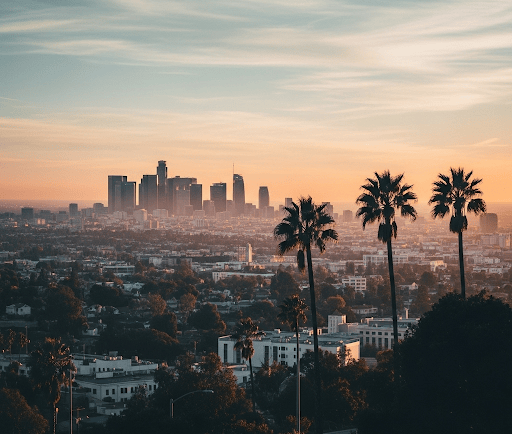Los Angeles's "Flames of War" Escalate: The Former City of Angels, Now a Scene of Confrontation?
6/9/20254 min read


Lately, things have not been calm in Los Angeles on the other side of the Pacific. On social media, several posts by President Donald Trump have set off a public firestorm. He described the situation in Los Angeles as an "invasion by illegal immigrants and criminals" and harshly condemned the "incompetence" of local officials. This can't help but make one ask: what exactly has happened to the once sunny "City of Angels"?
I. The Current Situation: A Head-on Collision Between Federal and Local Authorities, Streets Filled with Tension
From Trump's words, we can sense that Los Angeles is in a state of intense confrontation. The keywords in his posts are "riots," "insurrectionary thugs," "arrest the masked individuals," and "deploy the troops."
According to mainstream media reports, this is no exaggeration. Los Angeles is indeed experiencing social turmoil sparked by a fierce conflict between the federal and local governments over the issue of immigration.
Large-Scale Raids Trigger Backlash: U.S. Immigration and Customs Enforcement (ICE) has launched large-scale raids to apprehend undocumented immigrants in multiple locations across Los Angeles County, raiding shopping malls and factories and arresting dozens of people.
Street Protests Escalate into Clashes: These raids have enraged the local immigrant community and its supporters, who have taken to the streets, leading to standoffs with federal law enforcement. The protests have gradually escalated into violent clashes.
Trump's Hardline Intervention: Facing this situation, Trump quickly adopted a tough stance. He not only issued directives via Twitter to the Department of Homeland Security, the Department of Defense, and the Department of Justice to "take all necessary actions to liberate Los Angeles," but he also, in an unprecedented move, signed a memorandum forcibly deploying at least 2,000 National Guard soldiers to Los Angeles to protect federal property and personnel.
Strong Resistance from Local Government: California Governor Gavin Newsom and Los Angeles Mayor Karen Bass have voiced strong opposition, believing the federal government's move is "creating chaos" and condemning the Trump administration's immigration policies for spreading fear in the community.
It can be said that the Los Angeles of today features not only street standoffs between the public and federal law enforcement but also a white-hot conflict of principles and policies between the federal and local governments, and between the Republican and Democratic parties.
II. Deeper Reasons: Immigration Disagreements, Partisan Struggle, and Social Rifts
The "flames of war" in Los Angeles are no accident. They are a concentrated outbreak of deep-seated contradictions within American society:
Fundamental Differences on Immigration Policy: The Trump administration insists on a hardline immigration policy focused on cracking down on illegal immigration. In contrast, California, as a Democratic-led "sanctuary state," is relatively protective of immigrant communities and relies on immigrant labor. This fundamental difference in policy philosophy has put federal and local authorities at loggerheads over immigration.
A Power Struggle Between Federal and Local Authorities: Trump's move to bypass local government and directly deploy the National Guard is seen as a forcible intervention of federal power into local autonomy. This is not just about immigration; it is a political struggle over the boundaries of power between the federal and state governments.
Polarization of Partisan Politics: The positions of the Republican and Democratic parties on a series of issues, including immigration and law enforcement, have become increasingly polarized. Trump's tough rhetoric and actions are undoubtedly aimed at consolidating his support among the Republican base and reflect the pervasive partisan struggle of "opposing for the sake of opposition" in the current U.S. political landscape.
Legacy of Historical Social Contradictions: Los Angeles itself has a complex social composition and a history of conflict (such as the 1992 riots). Although the direct trigger this time is the immigration issue, it may also conceal deeper social fissures related to race, wealth disparity, and other issues, which are easily magnified when stimulated by specific events.
III. Future Predictions: Conflict Unlikely to Subside in the Short Term, with Far-reaching Political Implications
Judging by the current situation, this turmoil in Los Angeles is unlikely to subside in the short term.
Confrontation Will Continue to Escalate: The federal government's tough stance and the local government's firm resistance mean that the confrontation between the two sides will continue. Federal enforcement actions may persist, while public protests and opposition from local governments will not weaken and may even lead other regions to follow suit.
The Possibility of Judicial Intervention: As the conflict between federal and local authorities intensifies, it cannot be ruled out that the California government or related groups will resort to legal action to challenge the legality of the Trump administration's actions.
Impact on the U.S. Presidential Election: This event will undoubtedly become a major issue in the upcoming U.S. presidential election. Through his hardline stance, Trump is projecting an image of "law and order" to win over conservative voters. Meanwhile, the Democratic Party will use this incident to attack Trump's "authoritarian" and "anti-immigrant" policies.
Deepening Social Division: Regardless of the final outcome, this conflict will further exacerbate the divisions in American society. The animosity between immigrant groups, ethnic minorities, and liberals versus conservatives will become more severe, leaving a profound impact on American society.
The "smoke of gunpowder" in Los Angeles is a microcosm of America's deeper contradictions. It reminds us that in the context of globalization, issues such as immigration, the distribution of power, and social equity can all become sparks that ignite social conflict. We will wait and see how this turmoil evolves and what lessons it will bring to the United States, and indeed, to the world.
